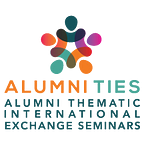Adapting to COVID-19 Restrictions
By Nomuntu Ndhlovu
In June 2019, I attended the Alumni Thematic International Exchange Seminar (Alumni TIES) on “Strengthening Business and Trade for Women Entrepreneurs in Africa” in Accra, Ghana. Following the seminar, I received an Alumni TIES small grant from the U.S. Department of State and used the funds to enact change in my community in South Africa. Taking place in the Nkomazi Municipality, “Financial Inclusion South Africa,” aims to assist 40 rural trading women to grow their businesses through financial literacy workshops, focusing on topics such as business development, business planning, and financial management.
I collaborated with two of my fellow Alumni TIES participants, Irene Mirembe from Uganda, and Thubelihle Ndlovu from Zimbabwe, to teach the participants business and financial management skills. The women who took part in the training were informal traders working in farming, beauty product distribution, fashion design, salons, and much more. They expressed their gratitude and satisfaction with the necessary skills that they were learning to expand and formalize their businesses.
For five months, the in-person trainings ran successfully, however, with the arrival of the pandemic, a national lockdown halted activity during the final month of the project. The scheduled activities could no longer continue in-person, and we decided to brainstorm alternative methods on how to continue. Ultimately, we arranged for participants to take part in one-on-one mentorship by telephone since the women could not afford to purchase data and their devices were not able to take part in online meetings. In addition to ensuring that the women were coping well with all the difficulties that came with lockdown, the mentors worked with them on how to get their businesses online. The goal was to move the participants’ businesses onto platforms such as WhatsApp business, develop Facebook pages, and advertise online to continue the growth of their businesses despite COVID-19.
One of the biggest challenges faced, however, was that although the businesses could go online, the delivery of the services or products was impossible. Due to the high cost of delivery, there were no real viable options to physically deliver their products and services. Our team was then pushed to brainstorm again a way around this issue and settled upon continuing to coach the women while also preparing them on how to conduct their businesses once the travel restrictions were loosened. The project team prepared a COVID-19 strategy file for them to implement post-lockdown and provided mentorship on how this may apply to their businesses.
Our initial plan to help participants open a savings and credit organization for their businesses needed to change too due to the national lockdown. With the restrictions, this was no longer possible, so we had to create a new way for the credit and savings organization to operate online. In response, our participant group created a new business that developed an app to allow the savings and credit organization to operate online. The app allowed the participants to create a constitution and a banking account in the form of a unit trust. It also allowed participant members to record the savings and credit that they received from other participants’ businesses.
To conclude the project, the final activity will take place in October 2020 where participants will present their COVID-19 business strategies and receive their certificates. Throughout this workshop, our team learned the importance of being flexible and adaptable to external changes in one’s environment, especially as women. However, the most important lesson of all was the realization of the significance of equipping women traders with financial literacy as it gives them the ability to expand their business and provides them with funds in unexpected crises such as the pandemic. Overall, this project has prepared these women to smoothly transition back into their trading, post-COVID-19 with their tailored plans to promote growth.
We are proud of the work done and how far these women have come!
Financial Inclusion South Africa is funded through an Alumni TIES small grant from the U.S. Department of State.
